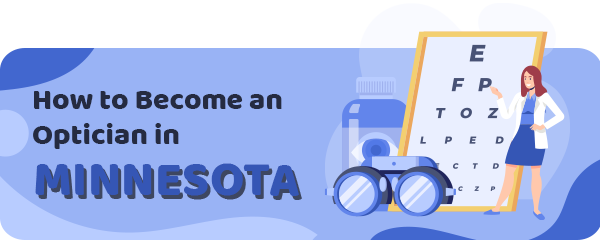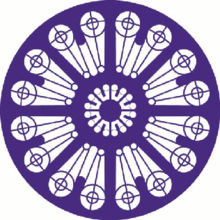In Minnesota, the demand for opticians in the state is consequently high, as these professionals play a vital role in enhancing the visual clarity of those in need.
Check out this article to learn more about becoming an optician in the distinctive setting of Minnesota!
Article Table of Contents
Optician Job Duties
In this field, two main forms of eyewear aid individuals in achieving better sight:
- Glasses or Spectacles
- Contact Lenses
The main role of an optician is to assist individuals with impaired vision in selecting the most suitable eyewear, considering their specific needs, budget constraints, and personal preferences.
Opticians adeptly handle a range of tasks integral to their profession, including:
- Preparing eyewear
- Precision fitting and adjustment of eyewear
- Providing comprehensive education on eyewear concerns and maintenance
- Maintaining meticulous sales records
- Calculating insurance co-pays for seamless transactions
- Efficiently managing inventory
- Establishing effective communication with labs responsible for crafting lenses
It’s important to note that while opticians excel in these aspects, their role does not extend to prescribing eyewear or conducting eye examinations.
Optician Training in Minnesota
In this state, the path to becoming an optician takes a unique turn, as specialized training and formal credentials are not mandated by the state.
However, trained and certified professionals find a job much faster.
The licensing organization in this state is the American Board of Opticianry.
For future opticians in Minnesota, the avenue of choice for honing their skills lies in apprenticeships under certified opticians.
Yet, even embarking on this hands-on journey necessitates meeting specific requirements, including:
- A high school diploma or equivalent
- A background check
- Details of the sponsoring optician
- Filling out an application
- Health history disclosure
- References
- Work history
Engaging in such apprenticeship programs lasts for about 2 years.
While hands-on training is important, obtaining a formal degree in the field is highly recommended.
For those seeking institutions to pursue their opticianry journey, there are some good options to look into.
St. Catherine University 
St. Catherine University presents a great opportunity for future opticians.
Here, students can attend the ophthalmic technology program, which will provide an Associate’s degree.
This program lasts 3 years, comprising 2 years of theory and a final year dedicated to practical experience.
University of Minnesota 
The University of Minnesota is a choice with its optometry program.
The eye care faculty has 9 subspecialties that candidates can choose from.
Graduates from this program are not only equipped to inspect eyes but can also release eyewear prescriptions.
| School Name | Address |
|---|---|
| St. Catherine University | 2004 Randolph Ave, St. Paul, MN 55105 |
| University of Minnesota | 100 Church Street SE, Minneapolis, Minnesota 55455-0213 |
Before enrolling in a program, there are several prerequisites to consider:
- A high school diploma or GED
- Completing specific classes with a minimum grade of C
- 2 letters of recommendation
- OAT scores – not older than 5 years
- Minimum GPA of 2.75
The classes in optometry programs typically cover the following subjects:
- Introduction to Optometry
- Ocular Anatomy
- Systems 1: Neuroscience
- Ocular Microbiology
- Ophthalmic Imaging
- Public Health Optometry
- Glaucoma
- Physics
- Math,
- English
Critical to your decision-making process is ensuring that the chosen program holds the approval of the Board.
Certification or Licensure for an Optician in Minnesota
Achieving licensure in Minnesota involves successfully navigating the National Board of Examiners in Optometry (NBEO) exam, a step in your professional journey.
The Minnesota Law Exam, available online, stands as an additional prerequisite before obtaining your license.
After you pass the exams, the Board requires a submission of additional documents.
Those approved usually receive their license in 48 hours.
Opticians often choose to take the exams offered by the American Board of Opticianry (ABO) and the National Contact Lens Examiners (NCLE).
To undertake both exams, a combined fee of $400 is required.
The ABO exam subjects cover essential aspects such as:
- Reading prescriptions,
- Fitting and dispensing spectacles
- Using standard ophthalmic equipment
On the other hand, the NCLE exam evaluates your expertise in:
- Pre-fitting for lenses,
- Diagnostic fitting,
- Dispensing of lenses,
- Patient education,
- Delivery
- Follow-up
These exams mandate a minimum passing score of 70%, and candidates can opt for assessments in either English or Spanish.
Optician Certification Renewal
License renewal is a recurring obligation every two years as mandated by the Board.
However, the certifications obtained from ABO-NCLE are subject to renewal every three years.
To facilitate this process, opticians are required to accumulate 40 credits.
Optician Salary in Minnesota
In Minnesota, the annual income for opticians typically hovers around $54,400.
While this provides a solid baseline, the national median salary for opticians stands slightly lower at $53,100 per year.
The table below sheds light on specific cities in Minnesota where opticians may find more lucrative opportunities.
Remember that several factors shape your earnings, such as experience and where you live.
Annual Salary Range:| Location | Avg. Annual Salary |
|---|---|
| Minnetonka | $56,500 |
| Wayzata | $56,500 |
| Saint Paul | $56,500 |
| Lakeville | $56,200 |
| Stacy | $56,100 |
| Afton | $56,100 |
| Wyoming | $56,100 |
| Vermillion | $55,900 |
| Bethel | $55,400 |
| Watertown | $54,900 |
Regional Salary in Minnesota
| Region | Employed | Avg. Annual Salary | Avg. Hourly Pay | Top 10% Annual Salary | Bottom 10% Annual Salary |
|---|---|---|---|---|---|
| Duluth, MN-WI | 70 | $43,010 | $20.68 | $49,950 | $32,200 |
| Minneapolis-St. Paul-Bloomington, MN-WI | 1,070 | $51,140 | $24.59 | $64,920 | $39,840 |
| Rochester, MN | 70 | $51,490 | $24.76 | $72,110 | $38,050 |
| St. Cloud, MN | 60 | $47,090 | $22.64 | $64,620 | $35,370 |
* Employment conditions in your area may vary.
Frequently Asked Questions
How can I stay updated on changes to the regulations regarding opticians in Minnesota?
Many organizations change their rules and regulations.
Here are some institutions that can help you stay up-to-date with changes in the industry:
- American Board of Opticianry (ABO) and National Contact Lens Examiners (NCLE)
- Association of Regulatory Boards of Optometry
- Association of Schools and Colleges of Optometry
- Board of Registration in Optometry
- Commission on Opticianry Accreditation
- Minnesota Association of Optometrists and Opticians
- Minnesota Board of Optometry
- Minnesota Optometric Association
Where can I find work as an optician in Minnesota?
Here are some of the places hiring opticians:
- Stores
- Offices
- Optometry practices
- Hospitals
- Clinics
What are the skills needed by an optician in Minnesota?
Opticians have the following abilities:
- Attention to details
- Good communication skills
- Adaptable to new situations
- Business skills
- Physical stamina
- Ability to perform repetitive tasks
Read the full guide: How to Become an Optician


